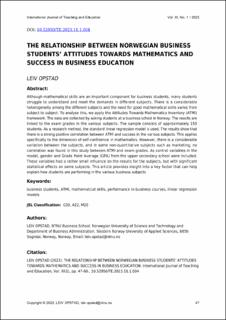| dc.contributor.author | Opstad, Leiv Trygve | |
| dc.date.accessioned | 2024-01-23T08:59:02Z | |
| dc.date.available | 2024-01-23T08:59:02Z | |
| dc.date.created | 2024-01-19T12:45:19Z | |
| dc.date.issued | 2023 | |
| dc.identifier.citation | International Journal of Teaching and Education. 2023, XI (1), 47-60. | en_US |
| dc.identifier.issn | 2336-2022 | |
| dc.identifier.uri | https://hdl.handle.net/11250/3113250 | |
| dc.description.abstract | Although mathematical skills are an important component for business students, many students struggle to understand and meet the demands in different subjects. There is a considerable heterogeneity among the different subjects and the need for good mathematical skills varies from subject to subject. To analyse this, we apply the Attitudes Towards Mathematics Inventory (ATMI) framework. The data are collected by asking students at a business school in Norway. The results are linked to the exam grades in the various subjects. The sample consists of approximately 150 students. As a research method, the standard linear regression model is used. The results show that there is a strong positive correlation between ATMI and success in the various subjects. This applies specifically to the dimension of self-confidence in mathematics. However, there is a considerable variation between the subjects, and in some non-quantitative subjects such as marketing, no correlation was found in this study between ATMI and exam grades. As control variables in the model, gender and Grade Point Average (GPA) from the upper secondary school were included. These variables had a rather small influence on the results for the subjects, but with significant statistical effects on some subjects. This article provides insight into a key factor that can help explain how students are performing in the various business subjects | en_US |
| dc.language.iso | eng | en_US |
| dc.rights | Navngivelse-DelPåSammeVilkår 4.0 Internasjonal | * |
| dc.rights.uri | http://creativecommons.org/licenses/by-sa/4.0/deed.no | * |
| dc.title | THE RELATIONSHIP BETWEEN NORWEGIAN BUSINESS STUDENTS’ ATTITUDES TOWARDS MATHEMATICS AND SUCCESS IN BUSINESS EDUCATION | en_US |
| dc.type | Peer reviewed | en_US |
| dc.type | Journal article | en_US |
| dc.description.version | publishedVersion | en_US |
| dc.rights.holder | Copyright © 2023, LEIV OPSTAD | en_US |
| dc.source.pagenumber | 47-60 | en_US |
| dc.source.volume | XI | en_US |
| dc.source.journal | International Journal of Teaching and Education | en_US |
| dc.source.issue | 1 | en_US |
| dc.identifier.doi | 10.52950/TE.2023.11.1.004 | |
| dc.identifier.cristin | 2230323 | |
| cristin.ispublished | true | |
| cristin.fulltext | original | |
| cristin.qualitycode | 1 | |

